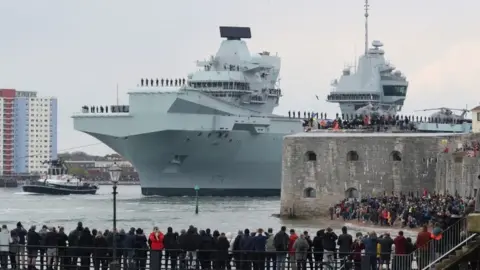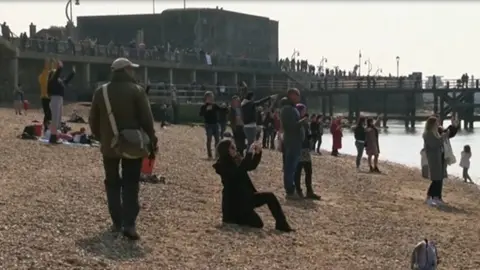HMS Queen Elizabeth leaves Portsmouth on maiden deployment
 PA Media
PA MediaAircraft carrier HMS Queen Elizabeth has left its home in Portsmouth ahead of its first operational deployment.
The £3bn warship was waved off by crowds who lined the city's harbour walls on Saturday afternoon.
It will lead the UK's Carrier Strike Group, which is taking part in an exercise off Scotland before departing for a tour of the Indo-Pacific region.
The ship began sea trials in 2017, having replaced HMS Illustrious which was scrapped in 2014.
It has eight RAF and 10 US Marine Corps F35B stealth fighter jets onboard and will be accompanied to Asia by six Royal Navy ships, a submarine, 14 naval helicopters and a company of Royal Marines.
Earlier, other members of the strike group, destroyers HMS Defender and HMS Diamond, also left the naval base in Hampshire.

They will be joined by US destroyer USS The Sullivans and the Dutch frigate HNLMS Evertsen while carrying out visits to India, Japan, South Korea and Singapore.
Commodore Stephen Moorhouse said: "This is an amazing capability and pulling that all together with our international partners is a real statement that the Royal Navy is very much in the premier league.
"The deployment takes us through the Mediterranean, the Middle East then operating with key partners in the Indo-Pacific just shows the Royal Navy has an ambition to be active on the global stage and operate wherever our politicians may feel fit."
Colonel Simon Doran, the senior US representative, said the deployment had been in planning for more than 10 years.
"It sends a message to potential adversaries, but also to our allies to reinforce should they ever be needed, we will be there, we generally always fight together so to deploy together really helps strengthen our relationship," he said.

Follow BBC South on Facebook, Twitter, or Instagram. Send your story ideas to [email protected].
